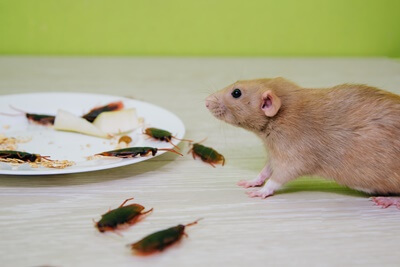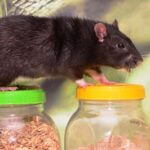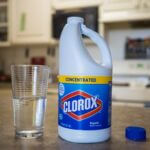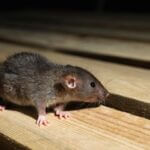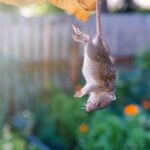Rats produce a foul odor because they spend most of their days exploring sewers, drains, and trash cans, accumulating bacteria and foul smells.
Since rats spend most of their time in hiding to avoid human detection, they often poop and urinate in nesting areas and isolated corners of your home.
Also, rats will likely die in nests and walls inside your home. Their decomposing carcasses can cause your home to stink, attracting flies, maggots, and other pests.
So, if you notice a strange odor in your home after cleaning it, check for vermin, like rats.
Does Your House Smell If You Have Rats?
A foul smell will likely build up if you have many rats in your home. Wild rats, especially in urban areas, are filthy creatures because they spend their time in unsanitary environments, such as:
- Garbage bins.
- Toilets.
- Sewers.
- Compost heaps.
- Damp areas.
Their bodies will pick up the smell of the areas they visit.
So, when rats enter your home, one of the first signs is an inexplicable (but offensive) smell. This odor will likely intensify as the rats settle in and explore new areas.
Aside from the presence of rats, these factors can make your home smell worse:
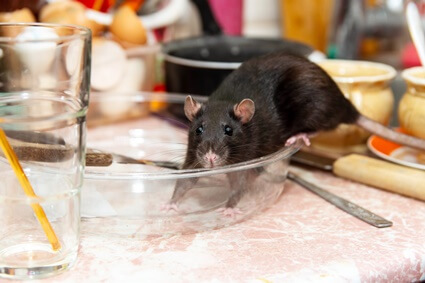
Droppings
When rats live in your home, they’ll cause a mess with their droppings. They tend to stay in hiding, so they’re likely to poop in isolated locations.
It may take several days or even weeks before you discover rat droppings. Most people realize they have a rodent problem when the droppings accumulate and start stinking up their homes.
If you suddenly notice a strong, unpleasant smell, look for other signs of a rat infestation. Make sure to check rat-prone areas, such as:
- Empty cabinets.
- Under your furniture.
- Other cramped spaces.
You will find rat droppings in these locations. Of course, rat and mouse droppings are often confused.
Urine
Rats urinate in their nesting sites, which causes these locations to stink.
Like other rodents, rats’ urine has a pungent, ammonia-like smell. This smell is created when the nitrogen in the urine breaks down in the presence of oxygen.
You can identify rat urine by the thin white streaks or dots. These streaks or dots run between cardboard boxes, bags, and other surfaces where rats sit or hide.
The smell of rat urine usually doesn’t go away on its own. So, you’ll need to clean any surfaces exposed to rat urine using an enzyme cleaner.
Dead Rats
When rats are about to die, they often retreat into remote locations to die alone.
This may seem like a win since you no longer have to deal with the annoying rodents. However, it can lead to a whole other host of problems.
Failing to remove a dead rat will cause the carcass to smell as decomposition sets in. This spreads an intolerable stench all over your house.
Moreover, the presence of a dead rat is likely to attract other pests and insects, including:
- Maggots.
- Flies.
- Ants.
- Even more rats.
This can further exacerbate an already difficult situation, and it might continue the existing smell and create a new, persistent smell in your home. So, it pays to know how to remove a dead rat.
Can You Smell Rats In Your House?
When you have a rat infestation in your home, one of the first signs is a dank, musty smell.
This is because rat fur traps moisture and dirt from their environment, causing the rats to retain odors from places they’ve been. If the rat has gotten wet or rolled in dirty liquid, this can also lead to a disgusting smell.
Additionally, rats urinate and leave droppings all over their nesting areas. The accumulation of droppings and urine eventually creates (and spreads) a repulsive odor throughout your home.
What Does Rat Odor Smell Like?
Wild rats naturally have a strong, musky odor because their thick fur traps moisture and dirt from the areas they visit. Furthermore, rats tend to poop and urinate freely, so their bodies pick up these smells.
If you have a rodent problem, you may suddenly notice a pungent smell permeating your home. It may smell damp, reminiscent of ammonia, or otherwise sharp.
What Does Rat Poop Smell Like?
Rat droppings have a pungent ammonia smell from the mixture of poop and urine.
Old rat poop tends to stink more than fresh droppings. The urine has been exposed to air for prolonged periods, producing ammonia.
The accumulation of rat poop inside your home is a serious health risk. According to the Current Allergy and Asthma Report, it’s because rat poop causes the spread of bacteria and triggers allergic reactions.
Direct contact with or inhalation of rat poop can transmit deadly diseases, including:
- Hantavirus.
- Plague.
- Salmonellosis.
Considering these risks, you need to be extra cautious when cleaning out rat poop.
Safety measures you can take when removing rat poop from your home include:
- Wear protective gloves to avoid direct contact with the droppings.
- Use a face mask to prevent you from inhaling contaminated dust.
- Open your windows and doors to ensure proper ventilation when removing the droppings.
- Collect the droppings with a paper towel and dispose of them in a sealable plastic bag.
- Wipe all affected surfaces using disinfectant.
- Clean your hands with disinfectant and hot water once you are finished.
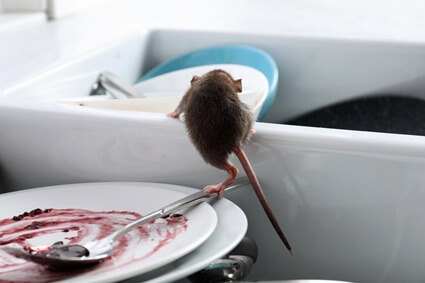
What Does Rat Urine Smell Like?
Rat urine has a strong ammonia-like smell that most people find nauseating. This pungent smell is caused by the breakdown of nitrogen contained in the urine when exposed to air.
Rat urine can spread a host of diseases, including:
- Leptospirosis.
- Lassa fever.
- Tularemia.
- Rat-bite fever.
According to one Journal of Allergy and Clinical Immunology, rat urine contains allergens that can trigger serious health complications.
That’s true in people with compromised immune systems and those with hypersensitivity to rats.
Wear protective clothing and use enzyme cleaners when cleaning surfaces contaminated by rat urine.
Why Do Rats Stink So Much?
Rats stink because they frequent dirty environments. As they forage for resources such as food and water, their fur carries dirt, grime, and moisture, which causes them to smell bad.
Moreover, rats urinate and leave droppings inside their nests. Over time, their bodies pick up these smells, causing them to stink.
Do Rats Stink When They Die?
Like all organisms, rats are subject to natural decomposition after dying. As their bodies decompose, they emit chemicals such as sulfur dioxide and methane, which produce a putrid smell. Of course, rats eat dead rats, but we must remove most of them.
If you notice the smell of a dead rat inside your home, locate the carcass and remove it to prevent the stench from building up and attracting more pests.

